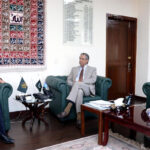UNITED NATIONS, Feb 10 (APP):The UN Economic and Social Council (ECOSOC) is considering various options to mobilize financing for the coronavirus-hit developing countries to enable them to avoid economic collapse, the 54-member body’s President, Ambassador Munir Akram of Pakistan, said Tuesday.
Briefing media representatives, he said that their aim was to ensure that the developing countries recover from the devastating pandemic in a more resilient, sustainable way as also to promote the sustainable development goals (SDGs).
The briefing was conducted by the ‘SDG Media Compact’, an initiative marking a new drive to advance awareness of the anti-poverty global goal.
The ECOSOC President said that funding could come from public and private sector, debt relief and restructuring and additional liquidity through new and redistributed Special Drawing Rights (SDRs).
Ambassador Akram said that there was also the need for redressing the structural inequalities which have led the world into the current and previous financial and economic crises.
What was need was the expansion of concessional lending by the multilateral development banks, the fulfillment of the Official Development Assistance (ODA) targets by all developed countries, and the fulfillment of their commitment to mobilize $100 billion for year climate finance which is yet to be achieved.
Other issues include halting the illicit flow of resources from developing countries to havens in mostly the richer countries.
“It is estimated that the developing countries lose somewhere in the range of trillion dollars each year in illicit financial flows through corruption and other practices, criminal practices, and this needs to be stopped,” Ambassador Akram said.
As regards the digital divide, he said while eighty-three percent of people in the advanced countries are digitally connected, only 17% have the facility in the poorest countries, meaning that the masses of the young people and children in developing countries are in the dark.
“Those who are not connected digitally are virtually in the dark and are being set back in their developmental education as well as in learning other skills for many years,” ECOSOC chief said, adding, “This will exacerbate the digital divide, which could become a development divide.”
He also re-emphasized the need for ensuring equitable access and distribution of the coronavirus vaccine, saying it was vital to control the pandemic.







